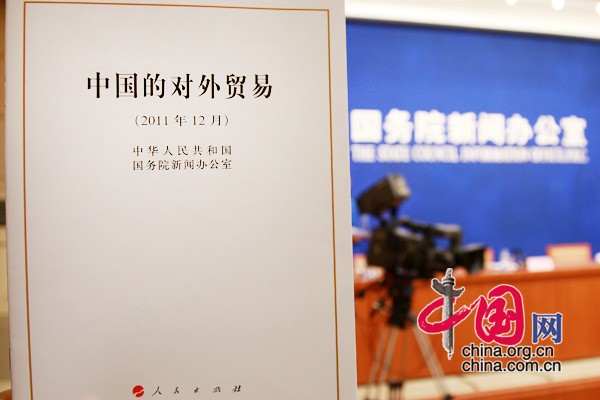China: World's top economic contributor
- By Li Huiru
 0 Comment(s)
0 Comment(s) Print
Print E-mail
China.org.cn, December 9, 2011
E-mail
China.org.cn, December 9, 2011
 |
|
On Dec.7th, the Chinese government released a white paper on its foreign trade. |
The white paper titled "China's Foreign Trade" was published by the State Council Information Office under China's Cabinet on Dec. 7. It highlights the country's achievements in boosting foreign trade and its contribution to the global economy.
China has become an important force for the steady growth of world economy, said Chong Quan, China's deputy international trade representative of the Ministry of Commerce.
He cited data from the World Bank that China's GDP contribution to the world was 4.6 percent in 2003 and 14.5 percent in 2009. China has become the second largest economy in the world and the largest contributor to the world economy.
He also cited data from Goldman Sachs indicating that China's accumulated contribution to the world economy exceeded 20 percent from 2000 to 2009, higher than that of the United States.
| Full Text: |
| China's Foreign Trade |
As of 2010, China had fulfilled all its WTO accession commitments, the white paper said. It listed a series of measures adopted by the Chinese government that the paper suggested had helped realize the sustainable development of foreign trade. The measures include fostering comprehensive competitive edge; promoting energy conservation and emission reduction; strengthening trade-related intellectual property protection; enhancing the quality and safety requirements of export products; raising import and export enterprises' sense of social responsibility; and promoting international cooperation in emerging industries of strategic importance.
According to the white paper, the quality of China's export products is constantly improving. These products are becoming more and more popular among consumers around the world, the paper said. The white paper cited a report from the Ministry of Health, Labor and Welfare of Japan on imported food, which shows tests on 20 percent of food imported from China in 2010, 99.74 percent was up to standard - higher than that of food imported from the U.S. and European Union in the same period.
China is one of the developing countries granting the biggest market access to the least-developed countries, the white paper noted. At the recent G20 summit in Cannes, President Hu Jintao promised to give zero-tariff treatment to 97 percent of the tariff items of exports to China from the least developed countries having diplomatic ties with China in the context of the South-South Cooperation.
Chong said given that there will not be fundamental economic improvement in Europe or the U.S., China will face severe challenges next year. However, he said he was confidence that China will not be affected much.
"China will shift its attention to exports to developing and emerging economies that are enjoying sound economic performances," Chong said. "What's more, when compared with other countries, foreign trade hasn't contributed as much to China's economy as people imagined. The contribution of foreign trade to German's economy accounts for 60 percent, while that to Japan's is 33 percent, and to China: only 20 percent or so. "





